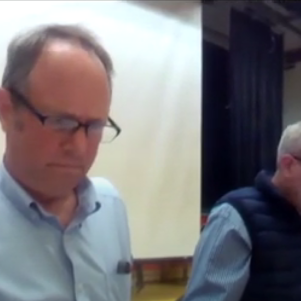U.S. Constitution Wins Appeal at Bunker Hill Community College; What About Other Massachusetts Campuses?
By Evan Lips | December 18, 2017, 17:30 EST

A disagreement between a state-run community college in Charlestown and a student group ordered by campus police last spring to stop distributing copies of the United States Constitution has finally been settled, resulting in a new policy increasing allowances for student expression.
A pro-free-speech organization, however, is now asking the consortium of Massachusetts’s 15 public community colleges why the revised policy has yet to be adopted statewide.
The dispute stems from actions taken by the Bunker Hill Community College student group Young Americans for Liberty, whose members were ordered last May to cease-and-desist from distributing copies of the Constitution on campus. The president of the Bunker Hill chapter, Jeff Lyons, had previously sought permission in March from the school to set up a table as part of an effort to distribute pro-libertarian literature.
The college denied him, noting that Young Americans for Liberty at Bunker Hill is an unrecognized student group.
According to J. Caleb Dalton, an attorney for the Alliance Defending Freedom — a pro-free-speech outfit — Lyons and other members then encountered a series of roadblocks in their bid for recognition. A scheduled meeting with the college’s student activities office was postponed to April 11, and according to Dalton, group members then submitted a formal application, “but despite multiple meetings and discussions since, has not received recognition or even a copy of the procedures on how to obtain recognition.”
Dalton laid out the above details in a letter sent May 30 to Kenneth A. Tashjy, an attorney for the Massachusetts Community Colleges System, which represents all 15 community colleges in the state.
Dalton recalled the May 3 attempt by Young Americans for Liberty to distribute copies of the Constitution at the community college and noted that “after a brief time, the students were approached by campus police, ordered to stop, and informed they were violating BHCC policy because they did not have permission to pass out literature.”
Fast-forward to Monday, where according to records recently posted online, Bunker Hill Community College now has an entry in its student handbook outlining a brand-new policy on student expression that includes language recognizing the rights of students to distribute literature.
Joining the Alliance Defending Freedom in challenging the college’s original decision to bar certain students from handing out literature was local attorney Andrew Beckwith of the Massachusetts Family Institute and representatives from the Philadelphia-based Foundation for Individual Rights in Education.
“A college campus should be a marketplace of ideas where students can peacefully express their views without fear of punishment,” Dalton said Monday in a prepared statement. “We commend Bunker Hill for adopting policy changes that protect free speech. These changes serve as a model to guide other schools, including other schools within the Massachusetts Community College System.”
On Monday afternoon the college provided New Boston Post with a prepared statement:
“This spring, Bunker Hill Community College received a correspondence from the Alliance Defending Freedom (ADF) raising concerns about some of the College’s policies and potential limitations on free speech rights. The College takes the concerns raised by the ADF very seriously. We have reviewed our policies and practices in order to ensure that all students and staff on our campus enjoy the full protections afforded under the 1st Amendment; these policies and practices are available in our Student Handbook.”
Last week the Alliance Defending Freedom sent a letter to attorneys representing Bunker Hill and other state-run community colleges, praising them for revising campus policies regarding literature distribution and thus avoiding litigation.
In his letter, however, Dalton pointed out that procedures pertaining to obtaining club recognition are still absent from the college’s website.
“Rather, BHCC’s Policy for Student Club Recognition refers interested students to the Student Activities Office to obtain a copy of the ‘club formation toolkit’,” Dalton noted. “Without publicly available standards, we have no means to assuage the concern expressed in our May 30 letter that the policy unconstitutionally gives unbridled discretion to decision-makers to discriminate against minority viewpoints.
“Requiring students to access their school’s rules or policies in person instead of a generally accessible means such as BHCC’s online student handbook is unreasonably burdensome and at odds with the need for transparency in institutional decision-making.”
Dalton added that the Alliance Defending Freedom has reviewed policies regarding student expression from all 15 community colleges listed on the state’s website, and found “significant concerns with six.”
Dalton wrote that the organization found the policies to be “inconsistent with the principle that non-disruptive student speech and expression activity, including the distribution of literature, may take place in generally accessible areas of college property without prior permission or an administrative assessment of its message.”
A call to the Alliance Defending Freedom on Monday afternoon requesting comment from Dalton was redirected to the organization’s media relations department. A message left, asking whether the community college consortium has responded to the organization’s latest concerns, was not immediately returned.
A receptionist who answered a call to the office of Tashjy, general counsel of the Massachusetts Community College System, directed a New Boston Post reporter to contact him via email.
Tashjy responded by saying he is unable to answer whether or not he has recommended that all 14 other community colleges in Massachusetts use the new student expression policy enacted at Bunker Hill Community College, citing his role as the system’s public attorney.
Dalton’s December 13 letter to Tashjy identifies concerns at six other Massachusetts community colleges: Bristol Community College, Holyoke Community College, Middlesex Community College, Northern Essex Community College, Quinsigamond Community College, and Springfield Technical College.
Read Dalton’s letter:
2017-12-13 MCCSletter by Evan on Scribd










